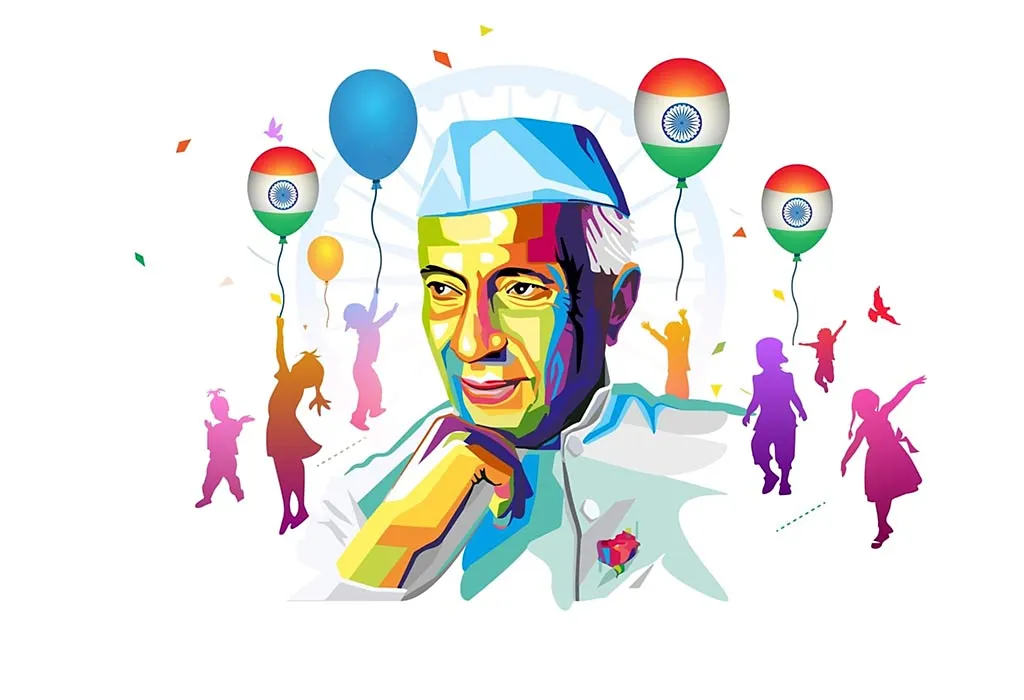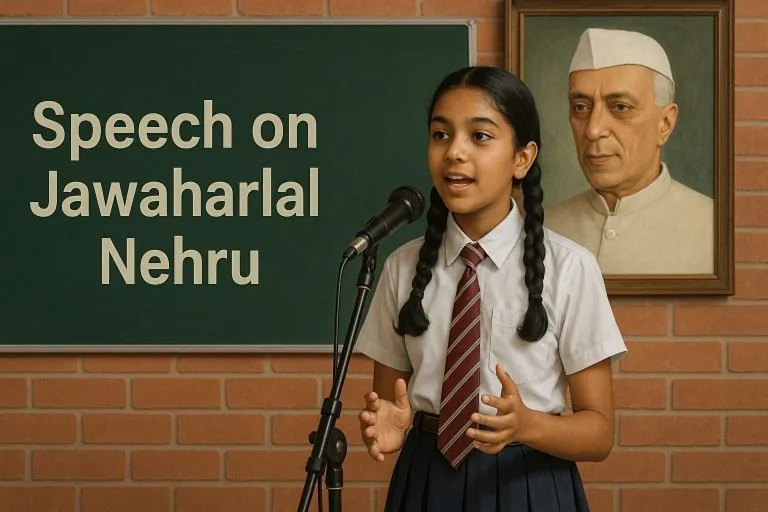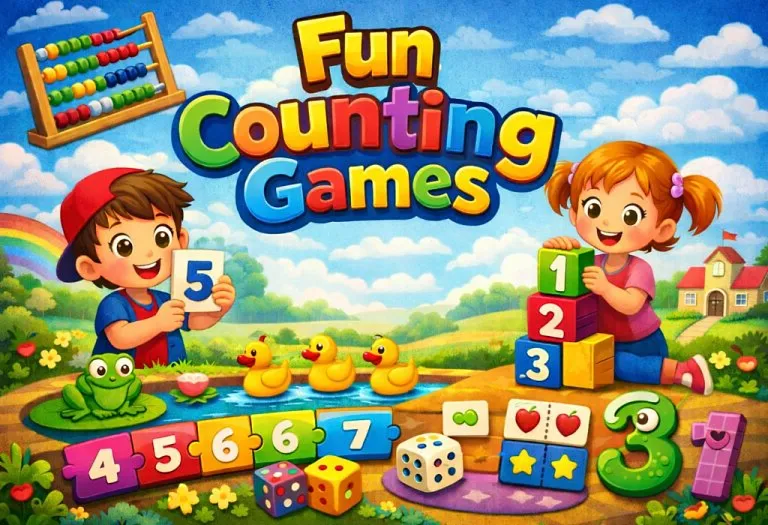Speech on Jawaharlal Nehru in English for Students and Children
- Points to Remember for Preparing a Speech on Jawaharlal Nehru
- 10 Line Speech on Jawaharlal Nehru
- Short Speech on Jawaharlal Nehru
- Long Speech on Jawaharlal Nehru
- FAQs
Welcome, dear listeners, to this very special gathering. In this speech for school students, we will embark on a journey to revisit the legacy of Jawaharlal Nehru. Our speech in English aims to recount facts and inspire and enlighten. Nehru was a freedom fighter, India’s first Prime Minister, and a champion for democracy and development. His passion for education and his endearing love for children earned him the ‘Chacha Nehru.’ As we delve into his life story, we find a man of great intellect and compassion whose vision for India was as grand as the diverse culture of our nation. His contributions have not just shaped the political landscape but have also sown seeds for a progressive society. Let us begin by appreciating his monumental role in shaping our nation and understand why his teachings still resonate with us today.
Points to Remember for Preparing a Speech on Jawaharlal Nehru
When preparing a speech about Jawaharlal Nehru, capturing the essence of his multifaceted personality and immense contribution to India’s history is essential. A well-structured speech should highlight critical aspects of his life and legacy, blending historical facts with engaging storytelling.
1. Early Life and Background
Discuss Nehru’s early life, including his birth date, family background, and education. Emphasise his father’s influence, Motilal Nehru, and the privileged yet nationalistic environment in which he was raised. This sets the stage for understanding his later choices and leadership style.
2. Education and Influence of Western Ideas
Detail Nehru’s education in England, first at Harrow and then at Cambridge. Highlight how exposure to Western ideas and his legal training at the Inner Temple in London shaped his political and social views.
3. Return to India and Involvement in Freedom Struggle
Discuss Nehru’s return to India and his subsequent deep involvement in the Indian National Congress and the freedom struggle. Highlight his close association with Mahatma Gandhi and his role in various national movements.
4. Nehru’s Vision for Independent India
Focus on Nehru’s vision for a newly independent India. Discuss his ideas about secularism, democracy, and social reforms and how these were reflected in his policies as Prime Minister.
5. Achievements as Prime Minister
Enumerate Nehru’s significant achievements as the Prime Minister, including establishing a planned economy, founding institutions for higher learning, and his foreign policy of Non-Alignment.
6. Literary Contributions
Mention Nehru’s literary contributions, particularly his books like “The Discovery of India” and “Glimpses of World History,” which provide insight into his profound intellect and view of Indian and world history.
7. Legacy and Continuing Influence
Conclude by discussing Nehru’s legacy and his continuing influence in modern India. Reflect on how his policies and visions have shaped contemporary Indian society and politics.
10 Line Speech on Jawaharlal Nehru
Preparing a 1 minute speech on Jawaharlal Nehru for classes 1, 2, and 3 can be an enriching experience. This brief speech aims to introduce Nehru in a simple yet informative way that is suitable for young minds.
- Good morning, everyone; today, I will talk about Jawaharlal Nehru, a great leader of India.
- Jawaharlal Nehru was born on November 14, 1889, celebrated as Children’s Day in India.
- He was the first Prime Minister of independent India and served our country for 17 years.
- Nehruji loved children very much, and he was fondly called ‘Chacha Nehru’ by them.
- He always wore a rose in his jacket, symbolising his love for nature and beauty.
- Nehruji believed that children are the nation’s future and should be given a lot of love and education.
- He played a significant role in India’s freedom struggle against British rule.
- As Prime Minister, he worked hard to make India a strong and modern country.
- He also wrote books for children, like ‘Letters from a Father to His Daughter’.
- Jawaharlal Nehru’s life teaches us the importance of hard work, love for one’s country, and caring for children.
Short Speech on Jawaharlal Nehru
Presenting a 2 or 3 minute speech on Jawaharlal Nehru is a wonderful opportunity for primary-class students to delve into the life of one of India’s most influential leaders. The following are two sample speeches, each tailored to capture Nehru’s essence in a brief yet comprehensive manner.
Sample 1
Good morning to all present here. Today, I am honoured to speak about Pandit Jawaharlal Nehru, a name synonymous with India’s freedom and progress. Born November 14, 1889, Nehruji was not just India’s first Prime Minister; he was a visionary who dreamed of an independent and prosperous nation.
His deep commitment to democracy, secularism, and scientific advancement laid the foundation for modern India. He passionately believed in the power of youth and education, leading to the establishment of various educational institutions. His approach as a leader was always inclusive, striving for social harmony and economic growth. He was a true friend of children, fondly called ‘Chacha Nehru,’ his birthday is celebrated as Children’s Day in India. His policies and reforms have shaped the India we live in today. In a 2-minute speech, it is challenging to cover his vast legacy, but it’s essential to remember Nehruji as a man who dedicated his life to building a nation we can all be proud of.
Sample 2
Respected teachers and dear friends, I want to talk about a great leader, Jawaharlal Nehru. As India’s first Prime Minister, he played a crucial role in shaping our nation’s destiny. Nehruji was not just a politician; he was an author, a thinker, and a beloved figure among children.
He strongly advocated for children’s education and welfare, believing they are the pillars of tomorrow’s India. Under his leadership, India embarked on an ambitious development journey, laying the groundwork for various industries and scientific research. His foreign policy of non-alignment kept India independent and respected on the global stage. Nehruji’s vision of a secular and united India continues to guide us today. In this 3-minute speech, I aim to inspire my fellow students to learn more about this great personality. Let us remember Jawaharlal Nehru as a historical figure, source of inspiration, and hope for future generations.
This speech for primary class students aims to provide a brief yet meaningful insight into Jawaharlal Nehru’s life and times, highlighting his contributions and values.
Long Speech on Jawaharlal Nehru

Delivering a 5-minute speech on Jawaharlal Nehru allows a deeper exploration of his life, ideals, and impact on India and the world. It provides ample opportunity to delve into various aspects of his legacy, making it a comprehensive and informative experience.
Sample 1
The esteemed audience, today I have the honour of talking about Pandit Jawaharlal Nehru, a stalwart of Indian independence and a visionary leader. This speech aims to encapsulate the journey of a man whose life was intertwined with the destiny of a nation.
Jawaharlal Nehru, born in 1889, was not just India’s first Prime Minister but a beacon of hope and progress in a newly independent country. Educated in England, his ideologies were shaped by global perspectives yet deeply rooted in Indian ethos. His return to India began an illustrious political career deeply influenced by Mahatma Gandhi’s principles.
Nehru’s contributions to India’s freedom struggle were immense. He participated in various movements, enduring imprisonment and hardship. His leadership during these tumultuous times was marked by a steadfast commitment to non-violence and constitutional methods.
As Prime Minister, Nehru’s vision for India was revolutionary. He laid the foundations of a modern secular state, championed the cause of democracy, and embarked on ambitious industrialization. His policies shaped India’s educational and scientific landscape, establishing prestigious institutions and fostering a scientific temperament.
Nehru’s foreign policy, based on non-alignment, kept India independent during the Cold War era. His legacy as a writer, evident in works like ‘The Discovery of India’, reflects his deep understanding of Indian culture and history.
Nehru’s life teaches us the values of tolerance, democratic spirit, and the importance of a scientific approach. His vision for India as a sovereign, socialist, secular, and democratic republic remains relevant today.
Jawaharlal Nehru was not just a political leader but a symbol of hope and progress. His vision, sacrifices, and achievements continue to inspire generations. As we commemorate his life, let us recommit ourselves to the ideals he cherished and worked tirelessly for.
Sample 2
In this speech on Jawaharlal Nehru, we will delve into the different facets of his life and legacy. Each subheading will highlight a significant aspect of Nehru’s journey, offering a holistic view of his contributions to India and the world.
Early Life and Education
Jawaharlal Nehru was born into a prominent family in Allahabad. His early education in India was followed by further studies in England, which shaped his worldview by blending Western liberal thought with Indian traditions.
Role in India’s Freedom Struggle
Nehru’s return to India began his active involvement in the freedom struggle. Under Mahatma Gandhi’s mentorship, Nehru became a pivotal figure in India’s quest for independence. His leadership in various national movements showcased his commitment to India’s freedom.
Vision for a New India
As the first Prime Minister, Nehru’s vision for India was progressive and inclusive. He focused on building a secular and democratic nation, laying the groundwork for industrialization and modernization. His policies in education and science laid the foundation for India’s future growth.
Legacy and Impact
Nehru’s legacy extends beyond his political achievements. His writings, including ‘The Discovery of India’, offer profound insights into Indian history and culture. Nehru’s impact on India’s foreign policy, his role in the Non-Aligned Movement, and his vision for a peaceful world order remain relevant.
Jawaharlal Nehru’s life was a testament to his dedication to India’s independence and development. His leadership, vision, and ideals continue to inspire and guide us. As we reflect on his legacy, let’s remember Nehru not just as a political leader but also as a visionary who dreamt of a better world.
FAQs
1. What were Jawaharlal Nehru’s significant contributions to India?
Jawaharlal Nehru significantly contributed to India by leading the nation as its first Prime Minister, laying the foundation for a modern, secular, and democratic India, and establishing key institutions for education and industry.
2. How did Nehru influence India’s foreign policy?
Nehru shaped India’s foreign policy through his principle of Non-Alignment, keeping India independent and neutral during the Cold War while fostering peaceful and cooperative relations with other nations.
3. Why is Nehru referred to as ‘Chacha Nehru’?
Nehru is affectionately called ‘Chacha Nehru’ or Uncle Nehru due to his deep love and affection for children and his belief in their crucial role in building the future of the nation.
Jawaharlal Nehru’s life and legacy embody the aspirations and dreams of a young, independent India. His contributions as a freedom fighter, statesman, and visionary leader continue to shape and inspire the nation. Remembering Nehru is to honour the values of democracy, secularism, and progress, which are fundamental to today’s India.
Also Read:
Children’s Day Essay
Interesting Facts About Chacha Nehru
Children’s Day Quotes, Wishes, Messages, and Slogans
Gandhi Jayanti Speech for Students and Children in English
Was This Article Helpful?
Parenting is a huge responsibility, for you as a caregiver, but also for us as a parenting content platform. We understand that and take our responsibility of creating credible content seriously. FirstCry Parenting articles are written and published only after extensive research using factually sound references to deliver quality content that is accurate, validated by experts, and completely reliable. To understand how we go about creating content that is credible, read our editorial policy here.














.svg)
















